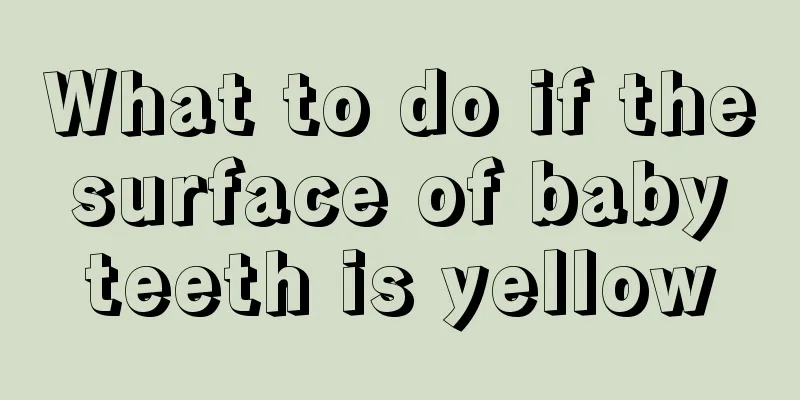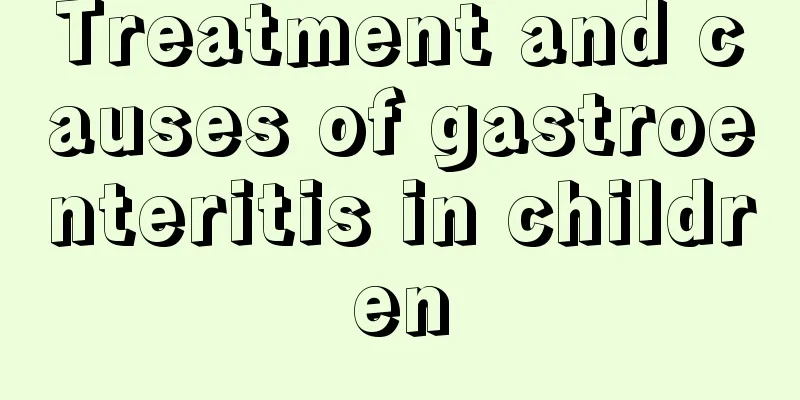Black teeth on children's teeth?

|
Babies' teeth are generally very fragile. If they are not protected properly, it is easy for their teeth to turn black. Most parents mistakenly believe that this is caused by improper diet or poor daily cleaning. In fact, it is not entirely due to these factors. There may be other reasons. So why do children's teeth surface turn black? The following introduces the reasons why children's teeth surface turns black. Causes of black teeth in children 1. The most common factor that causes children's teeth to turn black is tooth staining. This situation usually occurs when children mainly consume foods and drinks containing pigments, such as syrups, traditional Chinese medicine, etc. 2. Children's teeth turn black due to incomplete development of tooth enamel. This is mainly due to the poor calcification of children's teeth and uneven tooth surface. The teeth will initially show white spots on the teeth, which will gradually develop into enamel loss and black teeth. 3. Dental plaque causes children's teeth to turn black mainly because they have not developed good oral hygiene habits, which causes residual food in the mouth to ferment under the action of bacteria and adhere to the surface of the teeth. If it is not removed in time, it will slowly develop into caries. How to protect children's black teeth We have learned the reasons that cause baby's teeth to turn black, so let's "prescribe the right medicine" and find out the prevention and protection methods. The main way to prevent children's teeth from turning black is to develop good oral hygiene habits, brush their teeth in the morning and evening, rinse their mouths after meals, and try to eat less beverages and foods containing pigments. Black teeth caused by incomplete enamel development are determined by the child's physical condition during tooth development, such as calcium deficiency, certain high fever diseases such as pneumonia, etc. You can start oral care from the time your baby's first deciduous tooth erupts, so as to effectively prevent the formation of tartar and plaque. Once a child's teeth have problems that parents cannot solve, such as pigmentation or caries that cannot be brushed off with a toothbrush, parents should first find a specialist to identify the cause and then provide appropriate treatment. Generally speaking, the best time to conduct oral health education is within one year old. Parents can learn the eating and hygiene habits that maintain their children's oral health by visiting specialists, discovering oral problems as early as possible and dealing with them in a timely manner, which will be more effective. If you miss this time, it will be more difficult to correct it later. |
<<: Symptoms of vitamin B deficiency in children
>>: Symptoms of stomach flu in babies
Recommend
Treatment for red eyelids in babies
Children's skin is very fragile, and frequent...
What to do if the child's temperature is below 36 degrees
The child's body temperature is lower than 36...
What should I do if my 1-year-old baby coughs and has phlegm?
It is very common for one-year-old babies to coug...
What to do if your child has tooth decay in his permanent teeth
Children's teeth are not fully developed at a...
What causes fever in baby's hands and feet?
Baby fever is the most common thing in life, but ...
What to do if your baby has acute laryngitis
The baby is the treasure of the whole family and ...
Height of a two-year-old boy
Parents will pay close attention to their childre...
Height and weight standard for five-year-old baby
We all know that children’s developmental indicat...
What causes strabismus in children?
Under normal circumstances, our eyes are looking ...
What causes Down syndrome?
The cause of Down syndrome is something that many...
How much can blue light reduce jaundice in one day
If your baby has pathological jaundice, you must ...
What to do if your baby keeps biting his lower lip
Today, many parents have discovered that their ba...
How to deal with the symptoms of hot palms and soles of children
Compared with adults, children's bodies have ...
What are the early symptoms of vitiligo in children?
Infantile albinism is a very rare albinism accomp...
What should I eat when my baby has a fever and rolls his eyes?
Colds and fevers are the most common diseases in ...









